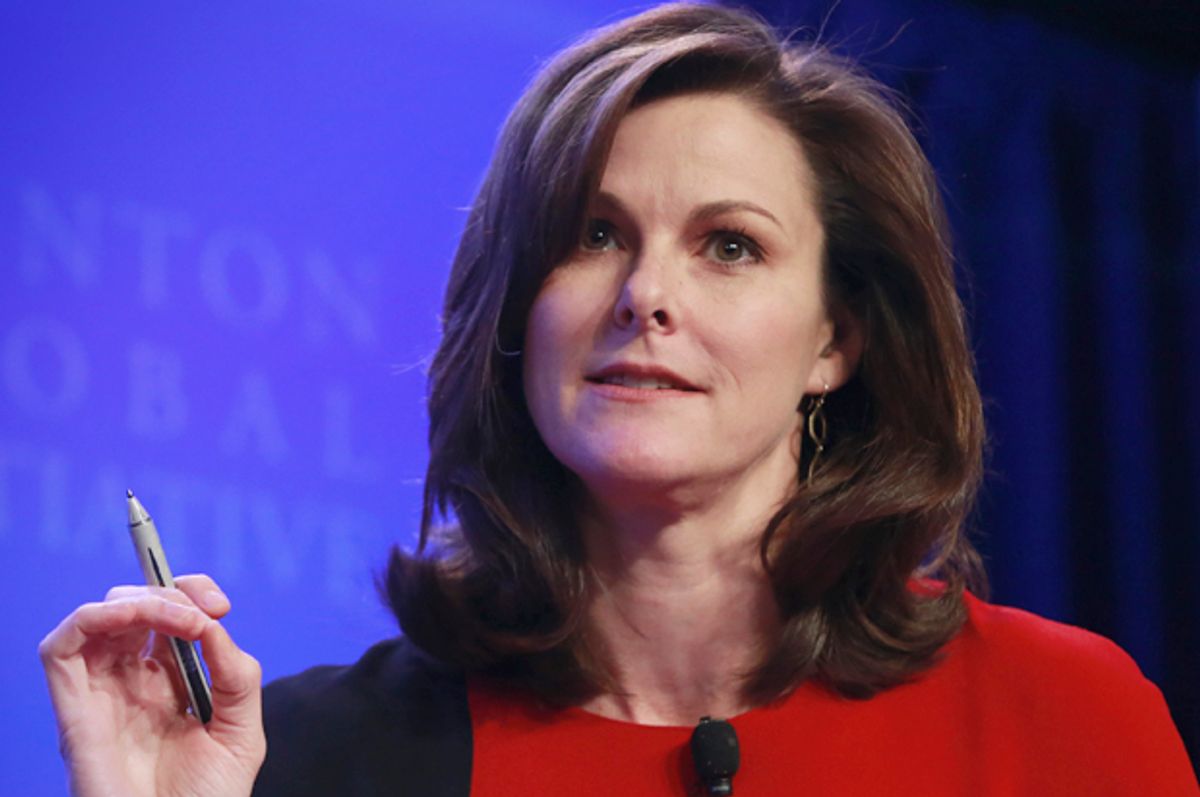Talk to some educational "reformers," and fixing the problems with our educational system sounds a lot like it does in "Freedom Writers." It's your classic nice-white-lady-meets-inner-city-school flick. Plopped into a classroom of "untouchables" from poor, minority backgrounds, our hero Hilary Swank is shocked to discover that the administration has given up on the kids to such a degree that they aren't even allowed to use books (the department head doesn't want them stolen or damaged).
Swank fights the system, having her students "toast for change" at the beginning of the semester. She gives them each a journal to write in and uses a racist chalkboard drawing as a pretext to teach about the Holocaust, organizing a trip to the Museum of Tolerance to complement her students' reading of "The Diary of Anne Frank." Naturally, the other teachers are none too keen on this overeager upstart making them look bad, and try to get her fired. In short, they fail and the movie ends with a joyful scene of Swank's kids graduating.
The notion that all troubled kids need is an amazing teacher — and its corollary: that students fail because they have bad teachers — has become the animating force behind the school-reform movement. It's also the idea behind a forthcoming lawsuit brought by former television anchor Campbell Brown on behalf of six New York City students and their parents. With newly launched advocacy group Partnership for Educational Justice and a coordinated media campaign behind her, Brown is taking aim at teacher tenure in New York.
“Failed education laws here in New York promote seniority over performance and fail to remove ineffective and dangerous teachers from the classroom," says Reshma Singh, executive director of the Partnership. "Our bipartisan group will give these families — and families across the state — the support they need to make sure New York students have access to quality teachers.”
In a New York Daily News Op-Ed announcing the suit, Brown argues that New York's teacher tenure laws violate students' "right to a sound education" by making bad teachers difficult to fire. Brown notes that it takes an average of 520 days to get a tenured teacher fired in New York — 830 if they are charged with incompetence — and that teachers are eligible for tenure after "just three years." In addition, Brown says, the state's "first in, last out" policy when it comes to layoffs prioritizes seniority over performance. The lawsuit resembles another case brought by the New York City Parents Union (the two are likely to be consolidated). It also comes on the heels of last month's decision in Vergara v. California, in which a judge found California's teacher-tenure laws violated students' right to "equality of the educational experience." To publicize her efforts, Brown's new group has hired the Incite Agency, a P.R. firm founded by former White House press secretary Robert Gibbs and former Obama campaign spokesman Ben LaBolt.
But academics who study education say Campbell's effort stems from a quixotic view of how education works. Audrey Beardsley, an associate professor at Arizona State University's Mary Lou Fulton Teachers College, started her career as a teacher. "I fell into such a utopian ideology, believing that schools and teachers can change and inspire everything," Beardsley says. "But current research suggests, unfortunately, that teachers only truly impact about 10-20 percent of student achievement." Other factors with a larger impact include parental income and education, which account for about 60 percent of the variation in student outcomes.
This not to say, of course, that teachers make no difference, or that every child doesn't deserve a competent instructor in the classroom. But the fact is that it takes a lot more than Hilary Swank with a stack of journals to help our neediest kids.
"I would love — love — to believe teachers could account for more like 90 percent of student achievement, but this is simply not reality," Beardsley says. "Until others realize this, pretty much all efforts at reform will continue to disappoint."
It turns out that figuring out who's a good teacher is pretty difficult. Starting in the George W. Bush era, policymakers began experimenting with what are known as "value-added" models that try to gauge teacher efficacy while controlling for factors such as family income and education. They've come up with dizzying mathematical formulas to try to tease out how much of a difference an individual teacher makes while excluding things like parental income. But so far these "value-added" models have been unreliable. Teachers rated excellent one year are found to be underperforming the next, and different "value added" formulas will yield wildly different results. Thus far, the most reliable methods we have for gauging teacher performance are evaluations by other professionals.
All of this is to say: A good teacher is no panacea, and it’s unclear how removing job protections for the large majority of experienced instructors — all on account of a few incompetent ones — will do anything but make teaching a less desirable profession.
The benefits of teacher tenure, on the other hand, are clear: It's a good thing when professionals can’t simply be fired on a boss’s whim. If you’re accused of wrongdoing or incompetence, you’re given due process. Unlike in California, where teachers are eligible for tenure after 18 months, in New York you have to have taught for three years and undergo numerous evaluations. Perhaps 520 days is too long to resolve a case, but that’s an argument for reforming tenure, not abolishing it.
"Tenure gives teachers a sense of job security that any other professionals might expect as, well, professionals," Beardsley says. "In the rarest of cases it can keep questionable teachers in the classroom, but by and large the teachers who are grossly ineffective do not earn tenure."



Shares